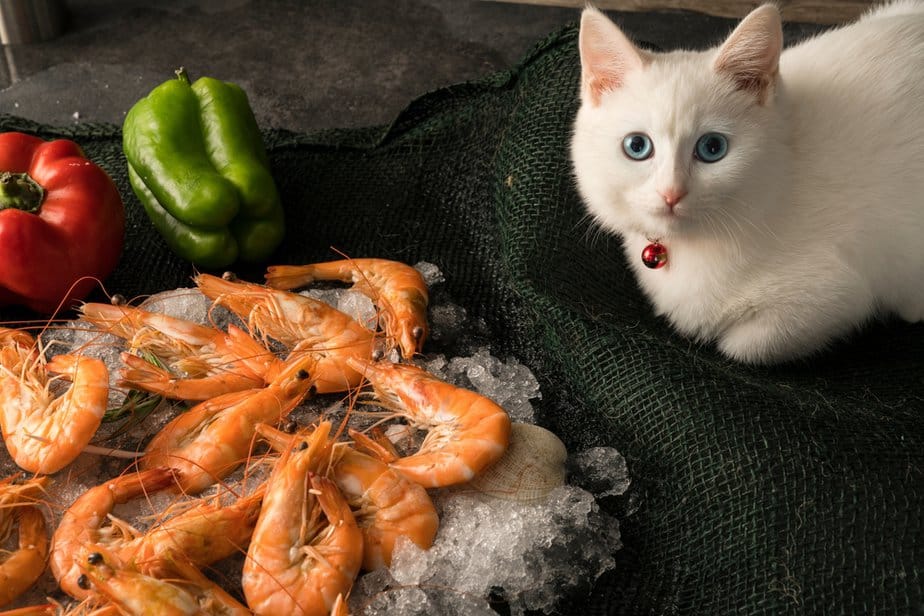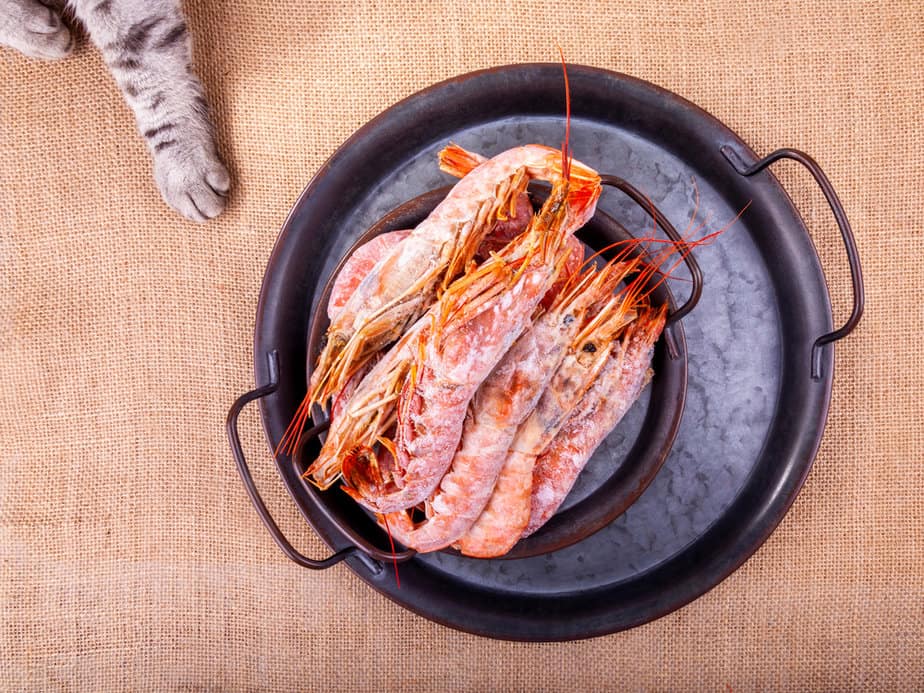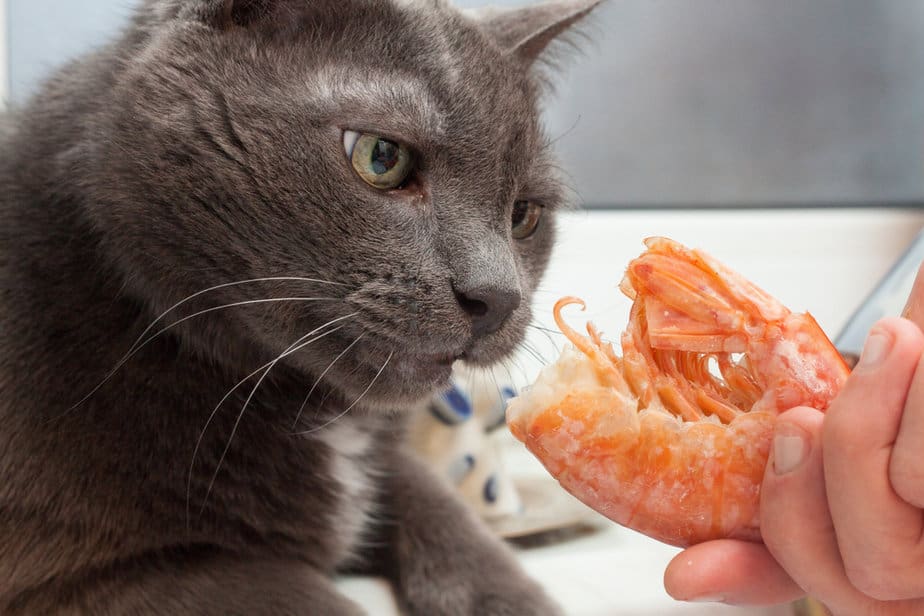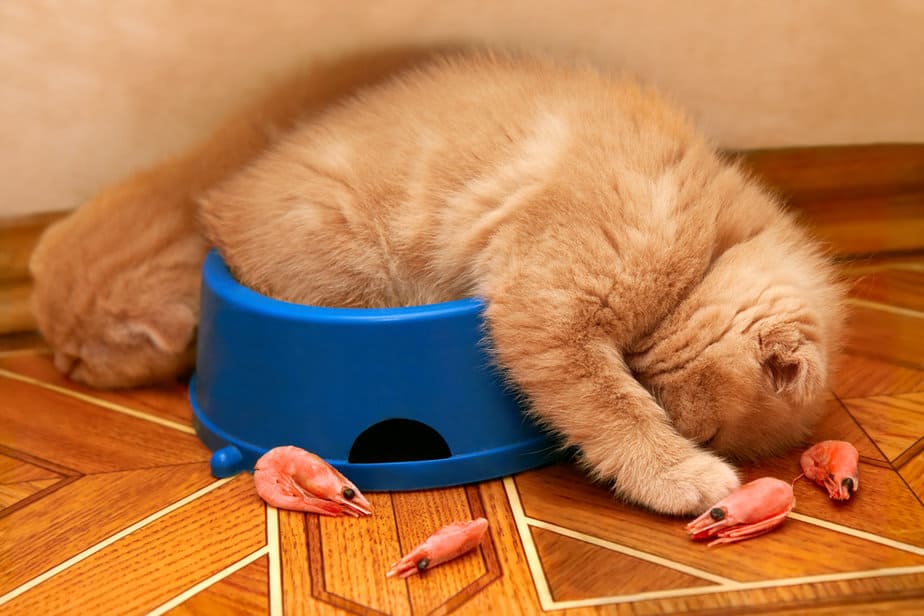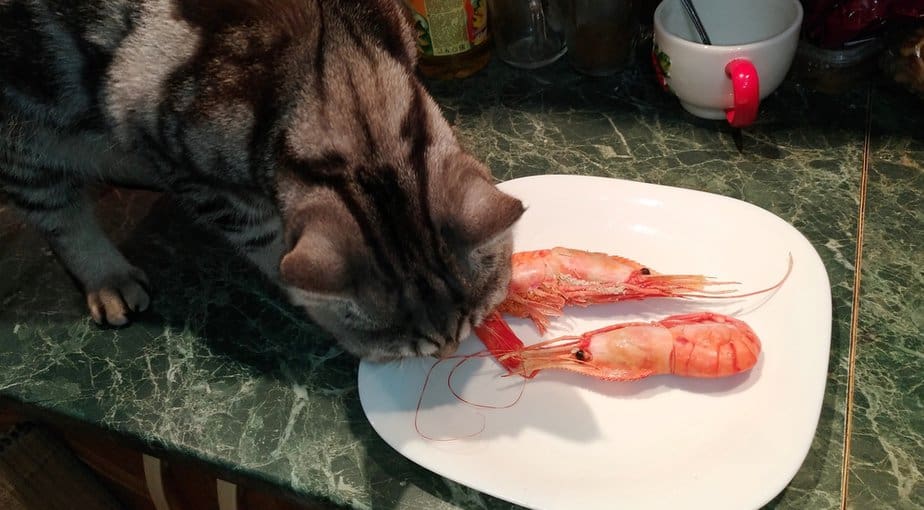📖 Table of Content:
It’s not a secret that cats don’t make that great of sailors. Their fishing ability isn’t really their highest achievement. However, this doesn’t stop them from eating seafood. Can cats eat shrimp, for instance?
We know how much our felines love to munch down on some fresh fish, so shrimp won’t be an exception?
Shrimp is a seafood delicacy across the globe. More importantly, they’re cheap and can be found in fancy restaurants and local shops.
This makes it easy for us to enjoy the seafood flavor at home. And this is probably one of the popular crime scenes.
When I say crime scenes, I think of what my cat usually does. She sneaks into the kitchen while I’m busy preparing the food and steals away my main ingredients.
These are usually meaty ones, of course. We know felines are obligate carnivores, but just how many nutrients can the shrimp offer them?
Can cats eat shrimp safely?
This question needs a bit more of further explaining, but we’ll eventually get to that part. All in all, shrimp is safe for cats to eat in moderation.
Just like mackerel, it provides your furry friend with several health benefits that come from the sea world. However, just like any other human food, it has its downsides.
You must be careful when feeding your feline shrimp. You can’t prepare them the same way you would prepare them for yourself, and you’ll find out why.
Health benefits
Shrimp is packed with nutrients and therefore health benefits. These are crucial for your pet’s health as they keep her fit and healthy.
However, this doesn’t mean that shrimp should be your pet’s main dish on the menu. Moderation is key, even with all of the following health supplements.
1. A chockful of protein
Shrimp, just like crab meat, is full of protein. It’s an essential nutrient that your cat can’t go without. Felines are obligate carnivores and require meat on a daily basis.
The main requirement is that they get protein from meat. It helps with the development of their bones and muscles.
Moreover, it boosts their immune system that’s responsible for keeping everything in check. Various other body functions, as well as brain functions, depend heavily on protein intake.
Without it, your pet is likely to lose weight and muscles rapidly. Lack of protein results in a weaker body, lower energy levels, and an inability to warm themselves.
We can say that cats are fully relying on protein to stay healthy. Therefore, make sure you provide your furry pal with this inevitable nutrient.
2. Good ol’ fats!
You might want to avoid fats because they tend to, well, make us fat. On the contrary, your pet will disagree with you.
Fats are a necessary nutrient that is, thankfully, found in shrimp and other seafood. They keep your pet’s energy levels up and make sure she stays warm during the cold winter days.
However, most of the fats are usually saturated ones that are unhealthy. They’re known for raising blood cholesterol which leads to heart diseases. But not with shrimp!
Fats found in shrimp are primarily unsaturated, healthy ones. Polyunsaturated fats and omega-3 fatty acids make up a large percentage of overall lipids in this seafood.
This is awesome news because they help your cat with various body functions. Unlike saturated fats, this helps prevent the increase of cholesterol levels in the blood.
That way, the chances of your pet suffering a heart stroke or cardiovascular disease decreases considerably. Furthermore, they feed your feline’s coat, giving it a fuller and shinier look. The same goes for her skin!
3. All the antioxidants
Free radicals can be a pain in the neck. They’re linked to a number of health issues, such as heart disease and cancer.
Thankfully, that’s where antioxidants step in! These powerful nutrients help fight off the unstable molecules, known as free radicals.
So, when you ask yourself “Can cats eat shrimp?”, these would be the ones to pop up in your memory. Antioxidants prevent diseases from developing and reduce the damage caused by oxidation.
4. Other health supplements
Shrimp, next to a load of protein and fats, are packed with vitamins and minerals. Minerals, such as zinc and copper, make up the highest percentage of health supplements.
These two are important antioxidants that serve to prevent any type of inflammation. They help in the formation of bones and connective tissues.
When working together with iron, they aid the formation of red blood cells. This teamwork can help speed up the process of healing wounds.
To top it all off, antioxidants like these are crucial for the stability of your cat’s immune system!
Can cats eat cooked shrimp?
Cooked shrimp is an amazing dish to share with your furry friend. She’ll be delighted when she finds out that you two are having a dinner date!
However, don’t let her get carried away with this delicious meat. Since you’re the cook and you’re in charge of the meal, you have to be careful.
While cooked shrimp is a perfect way for your cat to get some protein and healthy fats, spices can be dangerous. Humans use spices for literally everything in order to give the food more flavor.
When it comes to cats, seasonings and spices like salt, garlic, and black pepper, aren’t welcome with open arms. They can be quite detrimental to their health.
Before you season the shrimp, remember that salt and garlic are toxic to felines. The sodium accumulation can lead to vomiting, seizures, and even death.
Similar symptoms are related to garlic poisoning. It destroyed cats’ red blood cells which leads to various types of anemia due to blood loss.
Also, oil is a common ingredient when making shrimp and other foods. While it isn’t toxic to pets, it won’t do them any good.
Therefore, make sure you cook the shrimp without any spices and seasonings. If you must use oil, use extra virgin olive oil as it’s the healthiest choice for your cat.
Can cats eat raw shrimp?
When you think about it, wild cats constantly eat raw food. What is the difference between our domesticated fluffballs?
If you wonder can cats eat raw shrimp, well, they surely can. However, there are some things that you need to take into consideration.
Raw seafood contains bacteria and germs that could harm your cat’s health. Just as is the case with raw lobster, these can be the cause of major health issues.
All of these pathogens that could be contained in raw shrimp can cause food poisoning. For instance, a bacterium known as vibrio can infect her organism and result in gastritis or cholera.
Other possible germs that can be found in raw seafood include listeria, salmonella, as well as clostridium.
Some common symptoms of being infected by these bacteria are vomiting and diarrhea. It’s a pain in the neck for both you and your feline, so make sure you cook the shrimp thoroughly.
Mercury and iodine poisoning
Methylmercury accumulates in the tissue of most sea creatures. If the fish is older and bigger, the mercury levels are probably higher.
This compound isn’t really dangerous to adult humans but can be lethal for your furbaby. Large amounts of methylmercury can cause mercury poisoning and this isn’t something you want to deal with.
Your pet could suffer from fatigue and seem lifeless; it can also affect her nervous system. To make matters worse, there’s no adequate treatment for mercury poisoning.
This can all be prevented by boiling the shrimp and other seafood, such as octopus. Next to mercury poisoning, iodine can also be a reason for concern.
Although it’s fairly rare, iodine toxicity can happen if your pet consumes large quantities of foods containing it. Therefore, make sure to supervise your feline’s shrimp intake.
Can cats eat shrimp tails?
Shrimp tails can serve as an amazing appetizer. Most people like to eat their shrimp with the tail intact because of the crunchy texture it has.
Although it’s a delicacy on its own, some cat parents decide to leave the tail out of their cat’s plate. While felines still love it if they’re allowed some, it can be a choking hazard.
If your pet’s overly consumed with this seafood, she can easily get carried away. The tail parts can get stuck in her throat and although boiled, can be hard to swallow.
Some people also tend to dispose of the heads while others indulge in them as well. The opinions are divided, but it’s probably better to be safe than sorry.
Can cats eat shrimp shells?
This one doesn’t call for any type of debate. While tails can and don’t have to be a part of the meal, shells should be left out completely.
These are hard to digest, so your pet is likely to experience some stomach upset after eating them. That is if she gets over the part where she’s chewing them.
Shrimp shells have a hard texture that, even if boiled, is hard to chomp down on. Your cat’s teeth are sharp, but they aren’t made for crushing the shells of a shrimp, or a crab, for instance.
What about canned shrimp?
Canned shrimp is never a healthy choice for your pet because of the various preservatives. While she’s most likely going to be fine when eating a small amount, any large quantities could do serious damage.
Most canned foods, including canned prawns, are packed with high salt levels. Sodium is used as a preservative to keep the food fresh and tasteful.
It prolongs the product’s shelf-life but its presence isn’t something you should be thrilled about. Sodium toxicity can occur in felines due to high salt intake.
While this is unlikely to happen after a quick bite of some canned shrimp, beware of this dangerous preservative. You can recognize salt poisoning by some common symptoms such as vomiting, diarrhea, and excessive thirst.
Is frozen shrimp okay for cats?
I know we said that uncooked shrimp is off the limits for cats. So, what makes frozen shrimp safe for cats to eat?
The thing is, freezing the food has the same effect as boiling it. You see, high temperatures kill off the potential germs and bacteria lurking in shrimp.
In the same way, the process of freezing eliminates the possibility of shrimps carrying certain diseases. All in all, we can say that cats can eat frozen shrimp, but with caution.
Make sure you don’t overfeed your feline with seafood for many different reasons we previously mentioned.
Shellfish allergy
Shellfish, which also includes shrimp, is one of the popular food allergies in humans, as well as in cats. It’s not uncommon for people to come into the vet’s office with their pets after eating some seafood.
This can also happen with fish such as sardines. If your pet starts to exhibit certain symptoms such as stuffy nose, rashes, itching, sneezing, and wheezing, then it’s probably an allergic reaction.
Moreover, your feline can have trouble with her digestive system and in severe cases, she can go into shock. While digestive issues may not be the reason for alarm bells, breathing difficulties should be taken seriously.
Conclusion
Whether you’re a fan of seafood or not, I bet your cat is! So, if you’re ready to treat her with some shellfish delicacy, go for it.
However, there are several precautionary measures you have to take when incorporating seafood into her diet. For instance, raw shrimp and seasoned shrimp shouldn’t be a part of her meal.
Canned ones are fine only if you rinse them off and put them out on rare occasions. Frozen shrimp are completely safe for your pet to eat as well.
To be clear, the best way to feed shrimp to your furry baby is to cook them properly without any seasonings or spices!
So, if your pet likes this shellfish, I’m more than glad to tell you that cats can eat shrimp safely. However, don’t overdo it because she can accumulate significant levels of mercury and iodine in her body.

